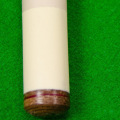On average, 18-21 ounces is the standard weight of a pool cue. That is the standard scale used by all manufacturers of pool cues. How heavy should my pool cue be? pool sticks (or pool cues) are usually 19 or 20 ounces. This weight range will work for most people and “house cues” in bars or pool halls generally weigh 19 ounces or 20 ounces.
For a pool cue, you want one that weighs between 18 and 20 ounces. Ideally, you should get a cue that weighs 18.5-21 ounces for American billiards and one that weighs 17-19 ounces for snooker. Most beginners to the game of billiards use bar and pool hall sticks instead of investing in a personal cue. When you are just learning to play, the stick is less important than developing a soft stroke and careful aiming.
The club will not play the game; the player will imbue the cue with his own talent and abilities. And, as you develop your game, you'll have a better idea of what you want and need in your personal signal. A warning about it; make sure that the cue you use is straight and has a good tip; the best players will be thrown out by a distorted cue. For your main game cue, use the weight that is most comfortable for you.
The most important tip regarding options for touching the weight of the cue and the hardness of the tip is to choose something with a stick. For more information, see Selecting a Signal. Graphite Fiberglass Billiard Cue & View All Pool Table Accessories For example, a heavier billiard stick weight will make your shot out of center even more, and you will find it harder to keep the line as you wanted. A lighter pool stick weight will glide better, shaking less out of line due to friction through the guide hand.
You'll also need less force to move a lighter cue, allowing you to be more refined with your shots. What else do you need to know about your ideal pool cue? Ask us. Return in original condition, read our policies. His first introduction to the weight of the pool cue was most likely when he took a look at the small numbers on a home cue in a pool hall or bar.
The weights of tacos de casa generally range from 19 to 20 ounces. Standard billiard cue weight ranges, as per manufacturers' specifications, range from 18 to 21 ounces, with half-ounce intervals in between. If you use a lighter weight cue, such as those weighing 18 or 19 ounces, the target ball will go to the pocket slowly and the cue ball will travel fast. will create more clicks on your shot; your cue ball will be dynamic and your target ball will go to your pocket at a slower pace.
By comparison, changing the leather tip of a normal block with the phenolic tip of a brake pad increases the breaking power of a stroke by 17%. You can take some of the guesswork out of selecting the weight of your pool cue by purchasing one that gives you the ability to adjust the weight yourself. As mentioned above, the optimal cue weight for each individual, which provides the best combination of speed and cue weight to produce the best cutting power, is something very personal. A major obstacle to heavier signals is that there are fewer maximum tip displacement shots from the center, as well as less maximum spin.
Once you develop a personal pool style and your technique matures, you may find that a 19.5 oz pool is more to your liking. If you are below average height or are shopping for a child, look for a shorter heel; they are available in lengths of 48 and 58. A heavier signal could also make it more difficult to avoid a double hit when shooting at the CB at a small distance from an OB. You should try different tacos by playing various games to find out which one best suits you. In general, heavier signals will create higher cue ball speed, but less steering control after contact with the object's ball.
The efficiency of the cue and tip can also affect breakage performance; although, some people may not like the feel of the hit with a really hard and efficient tip (e. Family Leisure offers McDermott pool cleats; their world-class products are manufactured here in the USA. UU. and offer unparalleled construction, consistency, materials and design.
GET A GRIP A variety of grips are available on pool cleats; however, not all grips are available in all styles or manufacturers. . .



